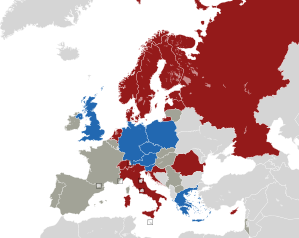The Eurovision Young Musicians 2002 was the eleventh edition of the Eurovision Young Musicians, held at Konzerthaus in Berlin, Germany on 19 June 2002.[1] Organised by the European Broadcasting Union (EBU) and host broadcaster Zweites Deutsches Fernsehen (ZDF), musicians from seven countries participated in the televised final. A total of twenty countries took part in the competition.[2] All participants performed a classical piece of their choice accompanied by the Deutsches Symphonie-Orchester Berlin, conducted by Marek Janowski.[1] Romania made their début while Italy returned to the contest for the first time since 1990.[1]
| Eurovision Young Musicians 2002 | |
|---|---|
| Dates | |
| Semi-final 1 | 15 June 2002 |
| Semi-final 2 | 16 June 2002 |
| Final | 19 June 2002 |
| Host | |
| Venue | Konzerthaus, Berlin, Germany |
| Presenter(s) | Julia Fischer |
| Executive producer | Ludger Mias |
| Director | János S. Darvas |
| Musical director | Marek Janowski |
| Host broadcaster | Zweites Deutsches Fernsehen (ZDF) |
| Website | youngmusicians |
| Participants | |
| Number of entries | 20 |
| Number of finalists | 7 |
| Debuting countries | |
| Returning countries | |
| Non-returning countries | |
| |
| Vote | |
| Voting system | Jury chose their top 3 favourites by vote. |
| Winning musician | |
Dalibor Karvay of Austria won the contest, with United Kingdom and Slovenia placing second and third respectively.[3]
Location
editThe Konzerthaus Berlin, a concert hall situated on the Gendarmenmarkt square in the central Mitte district of Berlin, was the host venue for the 2002 edition of the Eurovision Young Musicians.[1]
Built as a theatre from 1818 to 1821 under the name of the Schauspielhaus Berlin, later also known as the Theater am Gendarmenmarkt and Komödie, its usage changed to a concert hall after the Second World War and its name changed to its present one in 1994. It is the home to the Konzerthausorchester Berlin symphony orchestra.
Format
editJulia Fischer was the host of the 2002 contest.[1]
Results
editPreliminary round
editA total of twenty countries took part in the preliminary round of the 2002 contest, of which seven qualified to the televised grand final. The following countries failed to qualify.[1]
Final
editAwards were given to the top three countries. The third-place musician received €2,000, second-place €3,000, and the winner €5,000. The table below highlights these using gold, silver, and bronze. The placing results of the remaining participants is unknown and never made public by the European Broadcasting Union.[3]
| R/O | Country | Broadcaster | Performer(s) | Instrument | Piece(s) | Composer(s) | Pl. |
|---|---|---|---|---|---|---|---|
| 1 | Austria | ORF | Dalibor Karvay | Violin | Carmen Fantasie | Franz Waxman | 1 |
| 2 | United Kingdom | BBC | Sarah Williamson | Clarinet | Clarinet Concerto | Aaron Copland | 2 |
| 3 | Greece | ERT | Theodore Milkov | Percussion | Marimbaphone Concerto | Ney Rosauro | |
| 4 | Czech Republic | ČT | Jakub Tylman | Cello | Hungarian Rhapsody | David Popper | |
| 5 | Germany | ZDF | Alina Pogostkin | Violin | Introduction and Rondo Capriccioso | Camille Saint-Saens | |
| 6 | Slovenia | RTVSLO | Karmen Pecar | Cello | Cello Concerto | Dmitri Shostakovitch | 3 |
| 7 | Poland | TVP | Piotr Jasiurkowski | Violin | Gipsy Melodies | Pablo de Sarasate |
Jury members
editThe jury members consisted of the following:[1]
- United States – Leonard Slatkin (head)
- Italy – Gian Carlo Menotti
- Russia – Anna Gourari
- Slovakia – Jack Martin Händler
- Switzerland – Aurèle Nicolet
- Germany – Hans Peter Pairott
- United States/ Austria – Carole Dawn Reinhart
Broadcasting
editThe 20th anniversary competition was transmitted live over the Eurovision Network by 11 out of the 27 broadcasters in 23 countries. Belgium, Iceland and Malta broadcast the contest (the latter two for the first time), in addition to the competing countries.[4][5]
| Country | Broadcaster(s) |
|---|---|
| Austria | ORF |
| Croatia | HRT |
| Cyprus | CyBC (live) |
| Czech Republic | ČT |
| Denmark | DR |
| Estonia | ERR |
| Finland | Yle (live) |
| Germany | ZDF[6] |
| 3sat (live) | |
| Greece | ERT |
| Italy | Rai 3 |
| Latvia | LTV |
| Netherlands | NOS (live) |
| Norway | NRK (live) |
| Poland | TVP (live) |
| Romania | TVR |
| Russia | RTR |
| Slovenia | RTVSLO (live) |
| Sweden | SVT |
| Switzerland | TSI (live) |
| TSR (live) | |
| DRS | |
| United Kingdom | BBC |
| Country | Broadcaster(s) |
|---|---|
| Belgium | RTBF (live) |
| VRT | |
| Iceland | RÚV (live) |
| Malta | PBS |
See also
editReferences
edit- ^ a b c d e f g "Eurovision Young Musicians 2002: About the show". European Broadcasting Union. Archived from the original on 11 December 2013. Retrieved 5 October 2014.
- ^ "European Competition for Young Musicians". www.nmz.de. Retrieved 30 April 2018.
- ^ a b "Eurovision Young Musicians 2002: Participants". youngmusicians.tv. European Broadcasting Union. Archived from the original on 11 December 2013. Retrieved 5 October 2014.
- ^ "Austria wins the 2002 Eurovision Competition for Young Musicians". European Broadcasting Union. 4 February 2005. Archived from the original on 4 February 2005. Retrieved 4 May 2018.
- ^ "The 11th Eurovision Competition for Young Musicians". European Broadcasting Union. 4 February 2005. Archived from the original on 4 February 2005. Retrieved 4 May 2018.
- ^ from a documentary.
External links
edit
